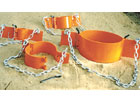
Are your slips, elevators, clamps, etc. in good enough shape to support the pipe you are running?
Editor's note: This column originally appeared in the December 2005 issue. It covers some important safety and prevention aspects of the drilling business, and generated such a response that it seemed wise to run it again.
I have been in the drilling/consulting business for more than 35 years, and I have seldom seen an article about fishing or fishing tools. This probably is a subject that most drillers would like to “just go away,” but it is part of our industry, like it or not.
If we stay in the drilling/well servicing business long enough, we are going to have a fishing job. It is an inevitable and unfortunate fact of life for us. A fishing job can take all the profit out of a well if it happens while you are drilling.
There are three things to consider when it comes to fishing - prevention, planning and preparation, in that order. The cheapest, fastest and easiest fishing job is the one you don't have to do.
By prevention, I mean: Are your slips, elevators, clamps, drill lines, etc. in good enough shape to support the pipe you are running? Are your crews well trained enough to handle the pipe safely without dropping it, or worse yet, hurting themselves? A worn-out hoisting plug or a kelly saver sub that makes up with one-eighth of a round, or raggedy set of elevators that you think you can get “just one more job” out of, might cost you more than the replacement. This doesn't mean that everything has to be chrome-plated-new, but it has to be able to stand the loads that you might put on it.
If everything seems fine when you are drilling ahead without problems, will it stand the strain when the pipe sticks, and you have to get a little rough to get it moving again? Is your mud the right weight and viscosity to prevent wall sticking and still clean the hole? Have you conditioned the hole well enough to run casing, or do you figure that you can just plow down through those clay balls and save some time. These are some of the things that will help to prevent a fishing job.
The next thing to help in the successful completion of a fishing job is planning. Do you have a taper tap, or preferably, a box tap to pick up your drill pipe if you should drop it? It won't do much good if it's back at the shop; it needs to be at the rig with the correct subs to run it in the hole when you have a problem. Drill pipe left in the hole while you round up the basic tools has a way of “growing roots.” The sooner you can get back on the fish, the better your chances of recovery. A box tap is better than a taper tap because you can circulate the hole as needed. If you have the room to run one, it is the better tool.
Also, if you have an unknown fish, it is a good idea to have an impression block available to ascertain what exactly you are fishing for before you make wasted runs and possibly damage the top of the fish beyond recovery. Your service truck should be equipped with a rope spear to recover submersible pump cable as well as tools to recover the common sizes of column pipe.
If you are faced with a fishing job, adequate preparation will simplify the operation and bring it to a quicker, more successful conclusion. If it is an involved fishing job, you might give a little thought to what you will run in the hole after the tool you have just spent all night building fails. If you plan and prepare for successive attempts to retrieve the fish, you won't be stuck with, “Well, it's noon and I can't figure out what to run next,” and waste a half-day.
The purpose of a drilling rig is to keep a bit on bottom, turning to the right. Anything that will help that will help your bottom line. If you can prevent a fishing job, then you have added to your bottom line. If you can minimize a fishing job, you have cut your losses. Our business is difficult enough without the added headache of “Geez, I don't know what to do next.”
When all else fails, don't hesitate to call in the experts. They know their business, which is to get you back on bottom, drilling as soon as possible.
ND

Report Abusive Comment